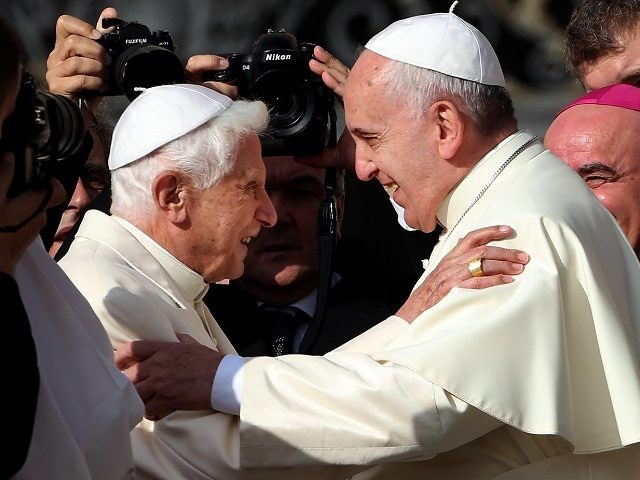Pope Francis praised his predecessor Pope Benedict XVI over the weekend, saying that his teaching continues to live on in the Church as a precious treasure.
In his address Saturday at the conferral of the Vatican Foundation’s annual Joseph Ratzinger-Benedict XVI Award, the Pope offered “an intense, affectionate thought to Emeritus Pope Benedict,” saying that “his prayers and his discreet and encouraging presence accompany us on the common path.”
Benedict’s “work and his magisterium continue to be a living and precious legacy for the Church and for our service,” he added.
Pope Francis, who is often contrasted with his predecessor, seemed anxious to underscore the continuity of his papacy with that of Benedict.
I invite your foundation to continue “studying and deepening this legacy,” Francis said, encouraging his hearers to delve deeply into the writings of Joseph Ratzinger and to apply his intellectual rigor to new fields where faith meets culture.
Pope Benedict is well known as an intellectual with a keen regard for the importance of doctrine. Even before becoming pope, Ratzinger fought attempts to smuggle Marxist categories into Catholic thought through “liberation theology.”
“Let us recall the fact that atheism and the denial of the human person, his liberty and rights, are at the core of the Marxist theory,” he wrote.
He also famously resisted efforts by Cardinal Walter Kasper and two other German bishops to water down the sacrament of marriage by admitting the divorced and remarried to receive Holy Communion.
“If the divorced are remarried civilly, they find themselves in a situation that objectively contravenes God’s law. Consequently, they cannot receive Holy Communion as long as this situation persists,” he wrote.
If these people were admitted to the Eucharist, he added, “the faithful would be led into error and confusion regarding the Church’s teaching about the indissolubility of marriage.”
Benedict was also known for his brutally honest assessment of Islam, contrary to the politically correct mentality of his time, which tended to view all religions as fundamentally the same.
Pope Benedict was derided by the media for his famous 2006 Regensburg address, in which he commented on the historical relationship between Islam and violence, but this was just one of his forays into a critical analysis of Islam.
Years ago, he wrote that the “interplay of society, politics, and religion has a completely different structure in Islam” than it does in the West. While much of today’s discussion regarding Islam “presupposes that all religions have basically the same structure, that they all fit into a democratic system with its regulations and the possibilities provided by these regulations,” this simply isn’t true, he said.
Rather, it “contradicts the essence of Islam, which simply does not have the separation of the political and the religious sphere that Christianity has had from the beginning,” he wrote.
In his address Sunday, Pope Francis said: “Joseph Ratzinger continues to be a teacher and a friend to all who exercise the gift of reason to respond to the human vocation of searching for truth,” while recalling his episcopal motto of “Cooperatores Veritatis” (collaborators of the truth).
“This expresses well the whole sense of his work and his ministry,” Francis said.
Follow Thomas D. Williams on Twitter Follow @tdwilliamsrome

COMMENTS
Please let us know if you're having issues with commenting.